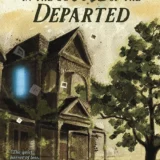Almost 35 years after Margaret Atwood’s The Handmaid’s Tale was published and nominated for a slew of awards including the Booker Prize and the Arthur C Clarke award (which it won in 1987), its follow up novel The Testaments has made it to the Booker shortlist even before its actual release day. Heavily anticipated, heavily embargoed, even more heavily promoted, The Testaments takes us back to Gilead not to tell us what has happened to just Offred, but to Gilead itself.
The world Atwood created for The Handmaid’s Tale may well ring truer to many more now in than it did in 1985, but it was always based in historical fact. The Testaments, too, is set in a recognisable world, though this story holds much more humour and much more hope than its predecessor. It is also wise—Atwood is, after all, much older and wiser now than she was 35 years ago—which is a long time to go back to a story, though The Testaments takes place about 15 or 16 years after the end of The Handmaid’s Tale, with some flashbacks to the founding year of the state of Gilead. Three female voices are employed to tell the narrative, the most vital one being that of Aunt Lydia, the frightening, formidable controller of all women’s matters in The Handmaid’s Tale.
Who was Aunt Lydia before she became the monstrous woman we met, the one woman who never seemed to doubt the patriarchal theocracy of Gilead, who employed all sorts of horrific, cruel methods to subjugate other women? Who is she now? Do we really know her, or understand her? Atwood tells Aunt Lydia’s story almost as one would in an espionage novel, and we see why Aunt Lydia chose to join the oppressors, rather than be one of the oppressed; that she understood exactly what it meant to be complicit in the reduction of women to nothing but chattel. “Better to hurl rocks than to have them hurled at you” says Aunt Lydia. And while it may not have been the ‘right’ moral decision, it was much more likely to allow her to live, to infiltrate the system, to gather information needed in order to both survive, and to have an eventual impact.
The immediate question of course is, did Aunt Lydia join hands with the Commanders just in order to survive? It’s important to remember that Atwood’s women have never settled for mere survival, though of course in Gilead, oftentimes that is enough. Aunt Lydia suffers no fools, nor wastes time rethinking whether she made the right choice when Gilead was first formed. “Such regrets are of no practical use” she says, “I made choices, and then, having made them, I had fewer choices. Two roads diverged in a yellow wood, and I took the one most travelled by. It was littered with corpses, as such roads are. But as you will have noticed, my own corpse, is not among them.” Via Aunt Lydia, we get an insiders perspective on Gilead which we didn’t have before: the rot that is spreading from within the state, the corruption and abuse that exists within the ranks of the Commanders, who are considered the highest powers in the state and forgiven any cruelty or abuse; but also the small, clever ways the aunts are able to save some of the young girls from forced situations, even within a system with such limited choices for women. As with any espionage, information is power, and “the Aunts had their methods, and their informants: no walls were solid for them, no doors locked.”
Aunt Lydia holds the reins of this story, but The Testaments is also told from the perspective of two younger narrators, Daisy and Agnes, each providing two different visions of Gilead. Agnes is a child of Gilead, a progeny of the very system Aunt Lydia helped set up, and she accepts her world for what it is, and attempts to make the best of her life within it. She has been told that “Men must make sacrifices in war, and women must make sacrifices in other ways. That is how things are divided” and that “Having faith is hard work sometimes.” But Agnes realises as a teenager that she doesn’t want the life designated to her. She wants more, but has no idea what more could mean, in a world where that just isn’t possible, even though “some people don’t want to live in any of the ways that are allowed.”
Daisy, a teenager raised across the border in Canada has been allowed to grow up with ease, and like other Canadians, she knows very well that Gilead is something to protest against, that it is not a utopia, no matter what the missionary Pearl Girls convincing fertile women to come to Gilead may say. Atwood has often used the north/Canada to represent a safe haven, a destination worth fighting to get to. This is evident in The Handmaid’s Tale, and now is just as much in The Testaments, with Canada being both the ultimate final destination for a safe life but also where potential salvation may come from. At the end of Handmaid’s Tale Offred thinks she is pregnant, and in the TV series, we see her have the baby and smuggle her into Canada. Atwood weaves in this strand from the TV show (but nothing else, not really), and Baby Nicole becomes the symbol for what Gilead’s Commanders fear, and what Gilead’s rebels desire: an escape, a possibility.

The Testaments is clever and astute and funny and tender. It is defiantly feminist. It tells you that ultimately a true sisterhood is all that matters, all that can be counted on to save the world. A true sisterhood regardless of blood bonds, one that is true in longevity, faith and even sacrifice for the greater good. Atwood of course has never claimed to be a feminist writer, because of her refusal to be labelled any one thing without deeper explanation of the label itself. She’s gone as far as saying that The Handmaid’s Tale is not a feminist novel, if that describes “an ideological tract in which all women are angels and/or so victimised they are incapable of moral choice’. But all that means is that Atwood’s female characters are not always ‘good’, they are not always in need of rescue, they are not above making immoral choices—at least, not necessarily in the traditional sense. What they are, though, always and as seen in The Testaments, is complex, varied and very, very human. As, of course, any character worth investing time and emotion in should be.
Atwood has always been interested in women as monsters. She has also always been interested in women as victims of monstrous other women, not just men. Aunt Lydia was one such monster in The Handmaid’s Tale, so an exploration of her character and history in The Testaments is both intriguing and welcome. She continues to do things that appear monstrous, but we now understand her motivation behind it—and it’s not as simple or as weak as the backstory the TV show gave her. Aunt Lydia in The Testaments is a fascinating, complicated and intriguing woman, and if there’s one thing Atwood does well, it’s giving her readers a new perspective on an old idea. “How easily a hand becomes a fist,” says Aunt Lydia.
The Handmaid’s Tale was about oppressive regimes, crimes against women and patriarchal sexual economics of women’s bodies in a claustrophobic theocracy. The Testaments furthers those elements without repetition and without bludgeoning readers with moralistic pedantic diatribes. Atwood is sharp and deft in her writing—she maintains her stance on the subjugation of women, on the importance of female bonds and on the sheer determination and intelligence of women to challenge what seems like an airtight hierarchy without ever repeating the patterns or even motifs of the Handmaid’s Tale. Gilead may have been created 35 years ago and has not changed in essence, but Atwood adds new elements to it now, just enough to give her plot room to grow; just enough for her characters to figure out who they are, what they want and how far they’ll go to make their world change. There are nods to aspects of The Handmaid’s Tale here, but Atwood has moved on from there, regardless of the recent resurgence in interest in the book following the TV show’s popularity. The Testaments explores how women can make changes even within a tyrannical regime that refuses them any agency at all: with cunning, perseverance, a complete conviction to the cause and so, so much patience. It’s fine to be playing the long game, Atwood seems to be saying, just as long as we don’t forget that we are.
The Testaments is available from Knopf Doubleday.
Mahvesh loves dystopian fiction & appropriately lives in Karachi, Pakistan. She writes about stories & interviews writers the Tor.com podcast Midnight in Karachi when not wasting much too much time on Twitter.










Recent Comments